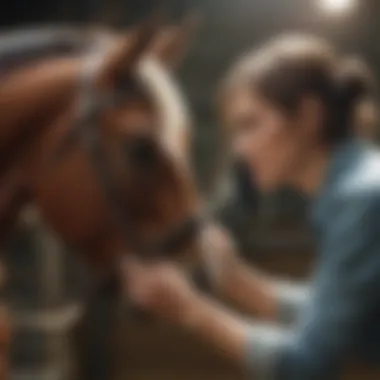Essential Horse Vaccinations: Annual Guide


Overview of the Topic
Vaccination is a fundamental aspect of equine health management. It protects horses from various infectious diseases that can pose serious health risks. Understanding the necessary vaccinations for horses each year is crucial for horse owners and caretakers. This knowledge ensures that horses receive proper immunization, thereby preventing outbreaks of diseases that could jeopardize their well-being.
Definition and Importance
Vaccinations are biological preparations that create immunity against specific diseases. For horses, these include immunizations for illnesses like West Nile Virus, tetanus, and equine influenza. Vaccination is not merely a legal requirement; it is an ethical responsibility for horse owners to safeguard their animals’ health. Without vaccination, horses can develop severe health complications, which may lead to chronic conditions or even death.
Current Trends
Today, there is a growing awareness in the equine community about the importance of vaccinations. Many veterinarians advocate for individualized vaccination plans based on factors such as age, health status, and local disease prevalence. Additionally, advancements in veterinary science have led to the development of more effective and safer vaccine formulations. Keeping up with these trends can help ensure optimal horse health.
Key Techniques and Practices
Step-by-Step Guide
- Consult a Veterinarian: Always start with a professional assessment. This establishes a tailored vaccination schedule.
- Create Records: Maintain meticulous records of vaccinations. This includes dates, types of vaccines, and any adverse reactions.
- Implement a Schedule: Set up a vaccination schedule that aligns with the veterinarian’s recommendations. This usually involves annual boosters for core vaccines and specific vaccines based on risk factors.
- Monitor Health: After vaccinations, observe horses for any unusual behavior or reactions. Promptly report any concerns to a veterinarian.
Tools and Equipment Needed
To effectively manage equine vaccinations, consider having the following tools:
- Vaccination Kits: These often include syringes and needles specific for equine use.
- Coolers: Necessary for maintaining the proper temperature of vaccines until administration.
- Record Keeping System: This may be a digital software or a physical notebook.
Challenges and Solutions
Common Obstacles
Horse owners often face challenges like misinformation about vaccines, scheduling conflicts, or expense concerns. Additionally, some horses may exhibit anxiety during vaccinations, which can complicate the process.
Innovative Solutions
Educating oneself about vaccines is the first step to overcoming misinformation. Establishing a routine can help in managing scheduling conflicts. As for costs, explore different vaccine brands or practices, as recommendations vary.
Furthermore, using calming techniques, such as gentle handling and familiar surroundings, can help ease vaccination anxiety in horses. Training and desensitization practices can also mitigate stress associated with veterinary visits.
"Preventive healthcare through vaccinations is a cornerstone of equine well-being that every horse owner should prioritize." - (Source: en.wikipedia.org)
Ensuring immunization is not just a safeguard; it signifies responsible stewardship of equine health. Consistent attention to vaccinations will enhance the quality of life for horses and foster a productive relationship between horses and their owners.
Preamble to Horse Vaccinations
Vaccinations are a vital component of maintaining the health of horses. They help prevent the spread of infectious diseases that can have devastating effects on equine populations. Understanding the necessity of vaccinations is essential for all horse owners and enthusiasts, as families, farms, and professional stables can experience profound health impacts without a proper immunization strategy in place.
Effective vaccination not only safeguards the individual horse but also contributes to the overall welfare of the equine community. The specific elements of vaccination include the timing, types, and administration of vaccines that align with the horse's age and risk factors.
It is crucial to recognize the benefits of these vaccinations: they protect against diseases, enhance longevity, and improve the quality of life for these animals. Furthermore, proper vaccination records are often required for competition and travel, making them an essential aspect of responsible horse ownership.
Importance of Vaccinations
Proper vaccination can mean the difference between health and illness. Vaccinations, when used correctly, establish immunity against diseases that afflict horses. An unvaccinated horse is at greater risk of acquiring infections that might lead to significant health issues or even death. This is particularly relevant in cases of contagious diseases.
The importance of vaccinations is underscored by their role in stopping disease outbreaks. Significant illnesses, if not managed through vaccination, can spread swiftly among equine populations. The importance of regular immunization programs cannot be overstated for both young and adult horses alike. Owners must remember that prevention is often easier than treatment.
Overview of Common Diseases


Several diseases can impact horses and, without vaccinations, they pose serious health threats. Following is a brief overview of some common diseases that can be prevented through vaccination methods:
- Eastern and Western Equine Encephalomyelitis: Viral diseases transmitted by mosquitoes, leading to neurological issues.
- Tetanus: Caused by bacteria found in soil, it affects the nervous system and can be fatal.
- West Nile Virus: Another virus spread by mosquitoes, it can lead to severe neurological conditions in horses.
- Rhinopneumonitis: This virus can cause respiratory issues and has potential implications for pregnant mares.
- Influenza: A contagious viral infection that affects the respiratory system.
Understanding and preventing these diseases through proper vaccination protocols is essential. Equine health management should be a priority, and vaccinations play an integral role in this process.
Core Vaccinations for Horses
Vaccinations are vital in maintaining the health and well-being of horses. Core vaccinations for horses are those that are essential for every horse, regardless of their lifestyle or location. These vaccines protect against prevalent diseases that can lead to serious health complications or even death. Understanding the core vaccinations helps horse owners make informed decisions about their equine's health care.
The benefits of core vaccinations extend beyond individual horses; they also contribute to the overall health of the equine population. Vaccines prevent the spread of infectious diseases. By ensuring that all horses receive their core vaccinations, the likelihood of outbreaks decreases significantly within a community. With proper immunizations, horse owners can protect their animals from the effects of disease outbreaks, which can be costly in terms of both finances and animal welfare.
In addition to safeguarding health, vaccinations also play a role in disease prevention strategies required by competition organizers, boarding facilities, and various equestrian events. Horses may be required to present vaccination records as part of their participation. These protocols help protect all horses in a shared environment.
Each core vaccination targets a specific disease. This section will delve into the details of these essential vaccinations.
Eastern and Western Equine Encephalomyelitis
Eastern and Western equine encephalomyelitis are viral diseases transmitted by mosquitoes. These diseases affect the horse's central nervous system and can cause severe neurological symptoms, leading to serious complications or death. Vaccination against these viruses is crucial, especially in areas where mosquitoes are prevalent. The vaccine is generally administered annually, with a booster often given to younger horses.
Tetanus
Tetanus is a life-threatening condition caused by the bacterium Clostridium tetani. Horses are particularly vulnerable due to their lifestyle and exposure in the stable or barn environment. The vaccine for tetanus should be given annually, ideally in conjunction with other vaccines. A thorough understanding of the disease, its causes, and symptoms can help owners act quickly in case of infection. The vaccine can significantly reduce the risk of this preventable disease.
West Nile Virus
West Nile Virus is another serious concern for horse owners. This mosquito-borne illness can cause severe neurological issues. Mortality rates can be high among infected horses. Vaccination is key to preventing this illness, especially in regions where West Nile Virus is known to circulate. Horses should receive this vaccine annually, particularly if they are kept in areas with a significant mosquito population.
Rhinopneumonitis
Rhinopneumonitis, caused by the equine herpesvirus, can lead to respiratory issues and complications in foaling. This virus is prevalent in the equine community and can spread rapidly among horses in close contact. There are vaccines available aimed at reducing the incidence and severity of the disease, and they are recommended yearly. Keeping horses vaccinated helps maintain a healthier environment for both young and senior horses.
Influenza
Equine influenza is a virus responsible for respiratory illness in horses. It spreads quickly, especially in group settings like stables or during competitions. Vaccination against this virus is an important part of maintaining overall health. Annual vaccinations help to reduce the spread and severity of outbreaks. Monitoring the health status of horses post-vaccination is also essential to ensure no adverse reactions occur.
Each of these core vaccinations creates a strong foundation for the overall health of horses. By adhering to established vaccination protocols, horse owners contribute to the longevity and quality of life of their animals.
Risk-Based Vaccinations
Risk-based vaccinations are a critical aspect of maintaining equine health because they address specific diseases that may be more prevalent in certain regions or situations. Unlike core vaccinations, which are recommended for all horses regardless of their environment, risk-based vaccines are tailored to the individual horse's lifestyle, exposure risks, and geographic location. This personalized approach can significantly enhance a horse's immunity against diseases that they are more likely to encounter based on their living conditions and activities.
Before making decisions on risk-based vaccinations, horse owners should consider a few key elements:
- Geographic Location: Certain diseases are more common in specific regions. For instance, Potomac Horse Fever is typically found in areas near bodies of water, such as rivers and lakes, where the risk of exposure is higher.
- Horse Activities: Horses that participate in shows, races, or trail riding may encounter different health risks compared to those that are mainly kept as pets or for leisure riding.
- Exposure to Other Horses: Horses kept in boarding facilities, training stables, or areas where they may interact with other horses have higher risks of contracting contagious diseases like Strangles.
Implementing a vaccination strategy that includes both core and risk-based vaccinations provides comprehensive protection for horses. Consulting with a veterinarian is essential to determine which vaccinations should be prioritized based on the horse’s lifestyle and environmental factors.
Strangles
Strangles is a highly contagious disease caused by the bacterium Streptococcus equi. It mainly affects young horses and can spread rapidly through direct contact or contaminated surfaces. Symptoms may include swelling of the lymph nodes, fever, and nasal discharge.
Vaccination against Strangles can help lessen the severity of the disease or prevent it altogether. While the vaccine does not guarantee full immunity, it can significantly reduce the risk of outbreaks, especially in places where horses gather, such as shows and training facilities. Horse owners must also be aware that vaccination can occasionally trigger mild reactions, but the benefits generally outweigh the risks.
Equine Herpesvirus
Equine Herpesvirus is a complex of viruses that can lead to serious health issues in horses, including respiratory disease, abortion, and neurological disorders. There are several strains, and the severity of disease can vary. Vaccination against Equine Herpesvirus is particularly important for mares, as it can prevent abortion in late-term pregnancy and reduces the likelihood of respiratory outbreaks in young horses.


Regular vaccination schedules are essential as outbreaks can cause significant disruptions in boarding facilities and competition environments. Horse owners should consult their veterinarians regarding vaccination protocols, especially in the context of equine events or situations involving multiple horses.
Potomac Horse Fever
Potomac Horse Fever, caused by the bacterium Neorickettsia risticii, is a serious condition that can lead to severe gastrointestinal issues. It is often associated with the summer months, particularly in areas near water where the risk of contracting the disease increases.
Vaccination against Potomac Horse Fever is recommended for horses that live in or travel to high-risk areas. The vaccine can reduce the chance of disease but does not provide total immunity. Thus, it is crucial to maintain preventive measures, such as minimizing exposure to standing water and ensuring proper management practices. Regular veterinary advice will help tailor vaccination strategies that align with a horse's specific risks.
Understanding Vaccination Schedules
Vaccination schedules play a crucial role in maintaining the health of horses. These schedules outline the timing and frequency of vaccinations, ensuring that horses receive necessary immunizations at the appropriate intervals. Establishing a systematic vaccination regimen helps to mitigate the risk of infectious diseases, which can be detrimental to a horse's well-being.
Understanding the elements of vaccination schedules can assist horse owners in effectively managing their equine's health. Vaccination protocols not only aim to protect individual animals but also contribute to herd immunity in groups of horses. Consequently, when vaccination schedules are followed consistently, the overall prevalence of contagious diseases within a population can be significantly reduced.
A well-structured vaccination schedule takes into account several factors including the age of the horse, its health status, any previous vaccinations, and the specific diseases prevalent in the area. It is essential for horse owners to recognize these considerations to tailor an effective immunization strategy.
Additionally, maintaining clear records of vaccinations is vital. This information can inform future health decisions and help in tracking the history of the horse's vaccinations. Overall, an accurate understanding of vaccination schedules contributes not just to better individual health outcomes but ensures a proactive approach toward disease management within equine communities.
Initial Vaccination Protocols
The initial vaccination protocols are designed for young horses, often beginning at six months of age. This early intervention provides young equines with the foundational immunity they need as they grow.
The first vaccines typically include those for Eastern and Western Equine Encephalomyelitis, Tetanus, and West Nile Virus. While these vaccines focus on core diseases, the timing and grouping can vary. For instance, a standard practice is to administer the first doses in combination to ensure efficiency while minimizing stress for the horse.
Moreover, veterinarians play a critical role in determining an appropriate initial vaccination timetable. Depending on the horse’s unique circumstances and the prevalence of disease in the area, modifications to standard protocols may be warranted.
Annual Revaccination Requirements
After the initial series of vaccinations, annual revaccination is essential to maintain immunity. This process involves administering booster shots that reinforce the horse’s defense against previously vaccinated diseases. Typically, horses receive these yearly boosters for core vaccines like Tetanus, West Nile Virus, and Influenza.
Regular revaccination is not only a standard practice; it is also crucial for keeping up the horse’s health. Many horse owners might overlook this, but a failure to revise immune protection firmly places the horse at risk for serious diseases. Ensuring updates according to recommendations by veterinarians can significantly affect the longevity and quality of life of the equines.
Tailoring Schedules for Specific Needs
It is essential to tailor vaccination schedules to meet the specific needs of each horse. Different horses have different levels of risk based on their lifestyles, health conditions, and geographic locations. For instance, horses engaged in competitive activities may require additional vaccines due to their exposure to other animals and environments.
Special considerations might involve adjusting vaccine types or the timing of administration. Some owners might need to include risk-based vaccines, like Strangles or Potomac Horse Fever, particularly if there are known outbreaks in their regions.
Consulting with a veterinarian to establish a personalized vaccination schedule should not be overlooked. Not only does it ensure that the schedule remains pertinent to the horse’s immediate environment, but it also enhances the horse's overall health strategy.
In summary, understanding and actively managing vaccination schedules is fundamental to equine health.
Administration of Vaccines
Vaccination is a pivotal aspect of equine health management. To ensure that horses remain healthy and protected against various diseases, understanding the proper administration of vaccines is essential. This section covers critical elements related to vaccination techniques and post-vaccination care, emphasizing their significance for horse owners.
Proper Techniques for Vaccination
When administering vaccines, following proper techniques is crucial. Here are some key considerations to keep in mind:
- Preparation of the Vaccine: Before giving a vaccine, verify its expiration date and appearance. The vaccine should not be cloudy or contain particulate matter.
- Choosing the Right Location: The neck area is common for vaccinations, given the muscle structure. However, indepth knowledge of equine anatomy can aid in selecting the best injection site.
- Maintain Cleanliness: Ensure that all instruments used are sterile. Clean the area of vaccination with an alcohol swab. This minimizes the risk of infection.
- Injection Technique: Use a swift but gentle motion when injecting the vaccine. This reduces trauma to the tissue and enhances comfort for the horse.
- Volume and Dosage: Administer the recommended dose as specified in the vaccine protocol. Over or under-dosing can lead to ineffective immunization.
Overall, careful technique during vaccination helps to ensure effective immune response while minimizing discomfort.
Post-Vaccination Care
After the vaccination process, monitoring the horse's response is essential. Post-vaccination care involves several important steps:


- Observation for Reactions: Watch for common adverse reactions, such as swelling at the injection site or mild fever. Most reactions are minor and resolve on their own.
- Keep Environment Calm: Providing a relaxed atmosphere for the horse post-vaccination can enhance recovery. Avoid strenuous exercise for at least 24 hours.
- Hydration and Nutrition: Ensure that the horse has access to fresh water and quality feed. Good nutrition supports immune function and helps the horse recover.
- Record Keeping: Document the date and details of the vaccination. This creates a history that is invaluable for future healthcare decisions.
"Monitoring after vaccination allows for early identification of any unexpected health issues, ensuring timely intervention if necessary."
Implementing proper administration techniques alongside diligent aftercare creates a robust vaccination strategy. This approach not only protects against disease but also promotes the overall wellbeing of horses.
Monitoring Equine Health
Monitoring equine health is a fundamental aspect of horse care. It involves continual observation and assessment of a horse's physical state to ensure its well-being. Identifying potential health issues early is crucial, as many conditions can progress rapidly. This vigilance not only helps in swiftly addressing problems but also in maintaining a horse's overall vitality.
Identifying Adverse Reactions
After a horse receives vaccinations, it is imperative to monitor for any adverse reactions. These reactions can vary significantly among individual horses. Common signs to look for include:
- Swelling at the injection site: This is perhaps the most frequent response and usually subsides quickly.
- Lethargy: Horses may show diminished energy following vaccinations.
- Fever: A slight rise in temperature can indicate a reaction.
- Loss of appetite: A horse that refuses food or water may be experiencing discomfort.
- Colic: In some rare cases, more serious reactions can occur, leading to colic symptoms.
Promptly addressing any of these symptoms can prevent complications. If an adverse reaction appears severe or persists, contacting a veterinarian is essential. They will provide guidance on appropriate next steps, which may include treatment or monitoring.
Regular Health Evaluations
Regular health evaluations play a significant role in maintaining a horse’s well-being. These evaluations should be performed at least annually but can be more frequent if necessary. Key components of a health evaluation include:
- Physical Examination: A veterinarian will assess various aspects such as weight, coat condition, and overall physical appearance.
- Dental Check: Dental health is critical for proper nutrition and performance. An annual dental examination helps catch issues early.
- Hoof Care: Regular inspections of the hooves can prevent significant problems and ensure that shoes, if used, are fitting correctly.
- Vaccination Review: During evaluations, review the vaccination status to ensure that all horses are up to date with their required vaccinations.
Routine health evaluations not only detect existing health issues but also help in preventing future problems. Establishing a consistent schedule fosters long-term wellness and enhances the quality of life for horses.
Consulting with Veterinary Professionals
Engaging with a veterinarian is vital for effective horse health management. These professionals provide expertise that is crucial, especially regarding vaccinations. They can tailor immunization schedules based on each horse's unique environment, exposure risks, and health history. Regular consultations help to ensure that owners stay updated on the latest medical advancements and changes in vaccination protocols. Well-informed horse owners can significantly reduce health risks in their animals by collaborating closely with veterinary experts.
When to Seek Professional Guidance
There are specific situations where seeking a veterinarian's guidance is imperative. First, if a horse shows signs of illness after a vaccination, contact a vet immediately. Common adverse reactions include swelling at the injection site or fever. Additionally, if the horse has a history of allergies or severe reactions to vaccines, a veterinary consultation before any shots is essential.
• New Vaccination Protocols: Staying informed on new recommendations can come from veterinary professionals.
• When Introducing New Horses: If integrating a new horse into a stable, ensure its vaccination history is thorough and consult a vet accordingly.
• Special Health Conditions: Horses with pre-existing health conditions require a custom vaccination plan that only a vet can provide.
These considerations highlight why regular check-ins with a veterinarian are important for equine health management.
Building a Relationship with a Veterinarian
Establishing a strong partnership with a veterinarian is essential for optimal horse care. A veterinarian familiar with a horse's history can provide tailored recommendations that suit the individual needs of the animal. This familiarity enhances communication and trust, leading to better healthcare outcomes. Horse owners should not hesitate to ask questions regarding vaccinations and other health issues.
• Regular Appointments: Schedule regular check-ups to develop a rapport and ensure that the veterinarian is knowledgeable about your horse's health. • Participation in Training: Some veterinarians offer training sessions for owners, which can be educational and beneficial in understanding health practices. • Follow-Up Communication: After an initial visit, maintain communication for any follow-ups or questions regarding observations in the horse’s health or behavior.
Building this relationship fosters a proactive approach to horse health, ensuring that vaccinations and other healthcare needs are promptly addressed.
Culmination
Vaccination is a cornerstone of good equine health management. It serves a dual purpose: preventing diseases and fostering a stronger immune system in horses. Regular vaccinations protect not only the individual horse but also contribute to the overall health of the equine population. When horses are appropriately immunized, the risk of outbreaks of preventable diseases decreases significantly.
The Role of Vaccination in Equine Health
Vaccinations play an essential role in maintaining the health of horses. They help equip the immune system with the tools needed to fight off specific pathogens. This proactive approach to health management limits the potential for disease and ensures that horses can lead active, productive lives. Moreover, many equine diseases can have serious, sometimes fatal, consequences. Vaccination acts as a safeguard against such outcomes.
In addition to individual health benefits, widespread vaccination can create a herd immunity effect. This is particularly beneficial for farms and stables where multiple horses are present. By ensuring every horse is vaccinated, the risk of diseases spreading within a group is substantially reduced.
Long-Term Impact of Vaccinations
The long-term impact of vaccinations extends far beyond just individual horse health. Over time, vaccinated horses will demonstrate fewer illness incidents, leading to reduced veterinary costs and lower overall health care expenses. Furthermore, horses that are properly vaccinated can perform better in their respective activities, whether it is racing, showing, or working.
An investment in vaccinations is also an investment in the horse’s life quality. Healthy horses recover from injuries better, have improved energy levels, and can engage in their daily activities with vitality.
Thus, as horse owners and enthusiasts, understanding the vital importance of maintaining an effective vaccination schedule is crucial. It ensures not just the well-being of one horse but contributes to the integrity of the entire equine community.



